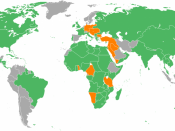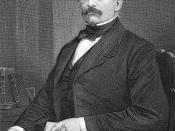Causes of World War One
In the late 19th century and early 20th there were a series of alliances between the superpowers of Europe. These powers included Britain, Russia, France, Germany, Austria-Hungary and Italy. The complex nature of the numerous alliances between the different powers along with the Balkan crises and the significant need for the preservation of Imperial power were largely responsible for the ensuing world war.
The alliance system developed in two parts. The first largely instigated by the German chancellor Otto Von Bismarck to preserve peace and the second when Bismarck's system collapsed in 1890.
The defeat of France in the Franco-Prussian war of 1970-71 was the completion of Germany's unification and the beginning of the rise of a new European power causing many new alliances to be formed. After the French defeat in the Franco-Prussian war France as a nation was angered as they had to pay an enormous war reparation debt and they lost the rich territory of Alsace-Lorraine.
This led France to seek out allies in Europe to try and exact revenge.
To try and keep France isolated in Europe Germany began allying themselves with other powerful nations. The first major alliance in the long and complicated sequence was between the German, Austrian and Russian emperors in 1872 called the Dreikaiserbund (the league of three emperors). In 1879 Germany formed another alliance secretly with Austria to gain an ally that shared a border and three years later were joined by Italy to form the triple alliance.
The problem the Germans faced was that Austria and Russia had conflicting interests in the Balkan's and over time the league of three emperors began to falter. The German response to this was to sign a new treaty re-iterating the previous agreement. This was called the re-insurance treaty...


